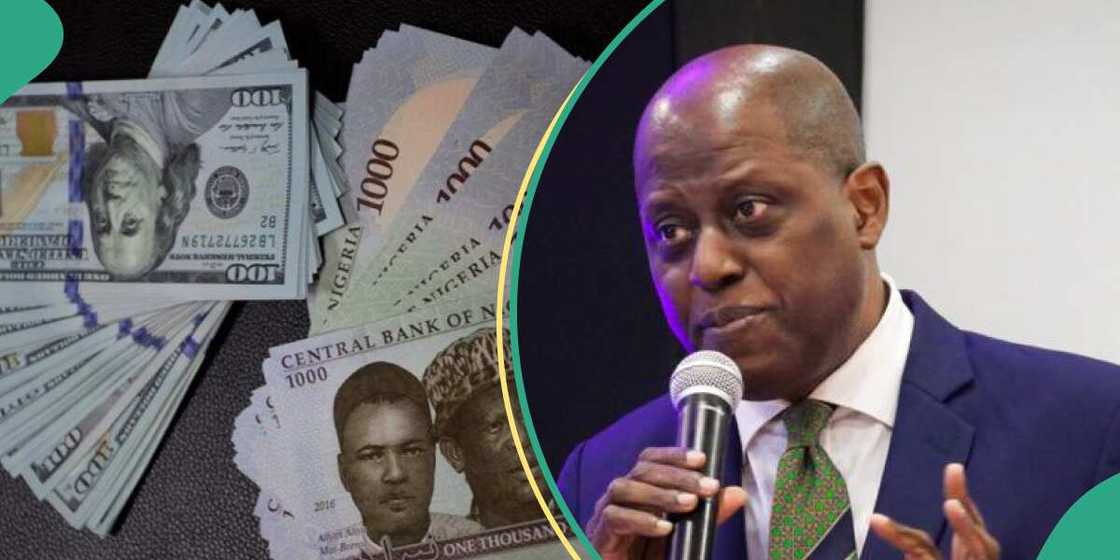Naira Weakens to N1,045 Per Dollar as CBN Fails to Meet Demand Over Low External Reserve
- The naira fell to a low of N1,045 on Wednesday, October 12, 2023
- Bloomberg reported that this was due to declining reserves and dollar inflow
- The disparity between the official and unofficial rates continues to widen
PAY ATTENTION: Click “See First” under the “Following” tab to see Legit.ng News on your Facebook News Feed!
The Central Bank of Nigeria is having trouble funding corporate and individual demand for the dollar, hence, the naira has continued to plunge.
According to a Bloomberg report, this is due to the declining reserves and dollar inflows, causing the Nigerian naira to collapse to new lows of N1,030 at the black market on Wednesday, October 11.
Meanwhile, Legit.ng found that the naira further plunged to reach N1,045 for the day.

Source: UGC
The gap between official and unofficial widens
The exchange rate has gotten further from the official rate, which was 765.8 dollars per unit on the FMDQ OTC trading platform.
PAY ATTENTION: Share your outstanding story with our editors! Please reach us through info@corp.legit.ng!
This demonstrated that there is still pressure on the currency to weaken even after the most populous country in Africa opened the market to broader currency exchange in June as part of measures meant to increase foreign investment and strengthen the country's economy.
Recall that Legit.ng reported that the CBN abolished all exchange rates, including the black market.
According to Abubakar Mohammed, chief executive officer of Forward Marketing Bureau de Change Ltd., which aggregates data on the informal market in Lagos, the local currency declined to N1,030 per dollar on Wednesday from N1,015 the previous day.
According to the statistics office, capital inflows in Nigeria fell 33% from a year earlier to $1 billion in the three months leading up to June as investors worry about capital controls and a sluggish economy.
Data from the central bank showed that external reserves decreased to a two-year low of $33.2 billion.
Umar Salisu, a foreign-exchange operator in Lagos, said:
“People are looking for dollars, both the seller and the buyer. Until there’s enough supply, you can’t predict the exchange rate.”
Speaking to the falling external reserve, Samuel Oyekanmi, a financial analyst, explained that what has affected Nigeria's reserve is the fact that the nation is not exporting as much, which is affecting the FX inflow.
He added that Nigeria is import-dependent, which means the country keeps spending FX for import bills, which is reflected in the reserve level.
Speaking on the importance of strong external reserve for the country, Oyekanmi said:
“A country always wants their external level to increase because it is one of the ammunition that the CBN uses to defend the exchange rate. So if you have it low, it means you don't have enough firepower to defend the exchange rate when you need to.
Legit.ng earlier reported that the CBN, in the first six months of 2023, sold over $5 billion to maintain naira stability in the foreign exchange market.
Naira weakens against foreign currencies as CBN fails on promise to clear FX backlog.
Over two weeks after the CBN pledged to pay off more than $10 billion in foreign exchange obligations owed to the Deposit Money Bank, the apex bank has still not done so, Legit.ng reported.
Bureau de Change agents in Lagos, Abuja, and Kano on Friday and Saturday said the naira continues to depreciate against the dollar and other currencies.
However, the naira strengthened on the Investor & Exporter FX window on Friday, September 22, 2023, rising to 747.76/$ from 772.98/$ on Thursday.
Source: Legit.ng





